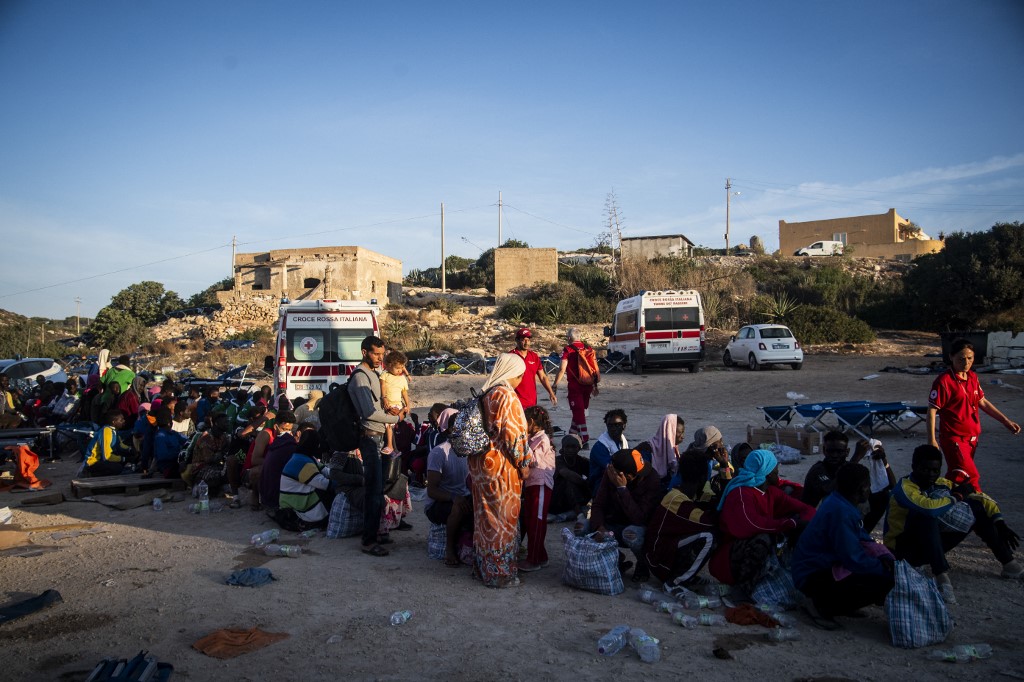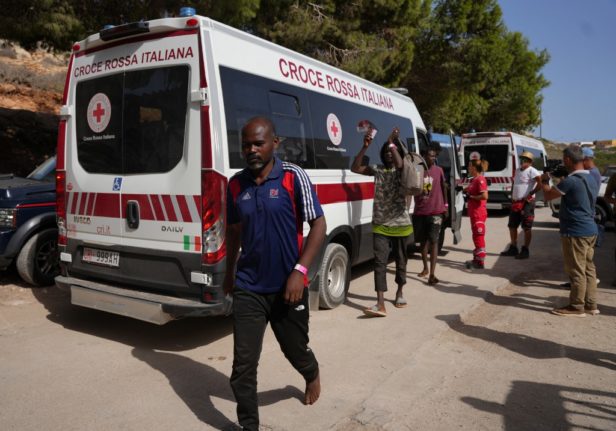Having come to power on pledges to curb mass migration, Italian Prime Minister Giorgia Meloni’s far-right Brothers of Italy party has since enacted a series of policies which have not stopped a soaring number of sea arrivals in 2023.
“Clearly we hoped for better on immigration, where we worked so hard,” she said in an interview marking the win, broadcast late Saturday on the TG1 channel.
“The results are not what we hoped to see. It is certainly a very complex problem, but I’m sure we’ll get to the bottom of it.”
Meloni’s post-fascist Brothers of Italy party was elected in large part on a promise to reduce mass migration into Italy.
But the number of people arriving on boats from North Africa has instead surged, with more than 130,000 recorded by the interior ministry so far this year – up from 70,000 in the same period of 2022.
EXPLAINED: What’s behind Italy’s soaring number of migrant arrivals?
After 8,500 people arrived on the tiny island of Lampedusa in just three days earlier this month, Meloni demanded the European Union do more to help relieve the pressure.
Brussels agreed to intensify existing efforts, and this week said it would start to release money to Tunisia – from where many of the boats leave – under a pact aimed at stemming irregular migration from the country.
Blaming Germany
But Meloni’s main coalition partner, Matteo Salvini of the anti-immigration League party, has been dismissive of EU efforts to manage the surge of arrivals that he dubbed an “act of war”.
The League this weekend also condemned Germany for funding an NGO conducting at-sea rescues in the Mediterranean, saying it represented “very serious interference” in Italian affairs.
Defence Minister Guido Crosetto, a member of Meloni’s party, weighed in on Sunday, telling La Stampa newspaper the move put Italy “in difficulty”.
“If Germany cared about the fate of people in difficulty and really wanted to help us save lives, they could help… (with plans) to seriously combat criminals who traffic people,” he added in a statement on Sunday evening.
IN NUMBERS: Five graphs to understand migration to Italy
Several charity rescue ships operate in the Central Mediterranean, the world’s deadliest sea crossing for migrants, although they only pick up around five percent of arrivals to Italy, according to Crosetto.
The German foreign office confirmed it was providing between 400,000 euros and 800,000 euros each to two projects, “for the support on land in Italy of people rescued at sea and an NGO project for sea-rescue operations”.

‘Protection money’
While interior minister in a previous government in 2019, Salvini blocked several charity ships from disembarking rescued migrants in Italy, a move that saw him prosecuted in Sicily on charges of kidnapping.
Since taking office in October, Meloni’s government has restricted the activities of the ships, which it accuses of encouraging migrants, while vowing to clamp down on people smugglers.
In April, weeks after more than 90 migrants died in a shipwreck near the town of Cutro on the coast of Calabria, it declared a six-month migration ‘state of emergency’, allocating 5 million euros to address the situation.
This was followed in May by the passage of the Cutro decree, which all but eliminated Italy’s special protection status for certain categories of asylum seekers and introduced harsher sentences for traffickers.
Agriculture Minister Francesco Lollobrigida sparked controversy at the time by saying Italy was facing “ethnic substitution” as a result of migration – comments opposition leader Elly Schlein dismissed as “disgusting” and as having “the flavour of white supremacism”.
Most recently, the government has sought to boost repatriation of arrivals ineligible for asylum, including by building new detention centres and extending the time migrants can be held there.
It emerged this week it would also be requiring migrants awaiting a decision on asylum to pay a deposit of 5,000 euros or be sent to a detention centre, prompting accusations the state was charging “protection money”.
The move was an “inhuman” gesture that unfairly targets “those fleeing famine and war,” parliamentarian Riccardo Magi of the +Europa party told reporters.
The centre-left Democratic Party said earlier this week that “on immigration, the Italian right has failed”.
“It continues on a path that is demagogic and consciously cynical, but above all totally ineffective both in the respect and safeguarding of human rights, and for the protection of Italy’s interests,” it said in a note.
The criticism of Germany comes after Berlin temporarily stopped accepting migrants living in Italy, after Rome itself suspended EU rules governing the distribution of migrants.



 Please whitelist us to continue reading.
Please whitelist us to continue reading.
Germany funding the NGO charity ship , disgusting all Italys arrivals shoud be sent to Germany.
What with Merkel inviting them all Germany has a lot to answer for.